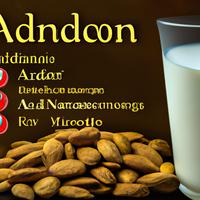
1 serving (240 grams) contains 30 calories, 1.0 grams of protein, 2.5 grams of fat, and 1.0 grams of carbohydrates.

Log this food in SnapCalorie

Nutrition Information
Calories |
30 | ||
|---|---|---|---|
% Daily Value* |
|||
| Total Fat | 2.5 g | 3% | |
| Saturated Fat | 0 g | 0% | |
| Polyunsaturated Fat | 0 g | ||
| Cholesterol | 0 mg | 0% | |
| Sodium | 150 mg | 6% | |
| Total Carbohydrates | 1.0 g | 0% | |
| Dietary Fiber | 1.0 g | 3% | |
| Sugars | 0 g | ||
| protein | 1.0 g | 2% | |
| Vitamin D | 100.0 mcg | 500% | |
| Calcium | 450 mg | 34% | |
| Iron | 0.7 mg | 3% | |
| Potassium | 160.0 mg | 3% | |
* Percent Daily Values are based on a 2,000 calorie diet. Your daily values may be higher or lower depending on your calorie needs.
Food Attributes
Source of Calories
About Non fat almond milk
Non-fat almond milk is a plant-based, dairy-free beverage made by blending almonds with water and straining out the solids. Low in calories and naturally free of cholesterol and saturated fats, it is a popular choice for those seeking a lighter alternative to traditional cow’s milk. Fortified non-fat almond milk often contains added vitamins like vitamin D, calcium, and vitamin E, supporting bone health and providing antioxidant benefits. Originating from European and Middle Eastern cuisines, almond milk has become a global staple, especially in vegan and lactose-free diets. Its nutty flavor makes it versatile for use in cereals, smoothies, coffee, and baking. However, some varieties may contain added sugars, so it’s important to check labels for unsweetened options. Additionally, it has lower protein content compared to cow’s milk, which might not meet the nutritional needs of everyone.



